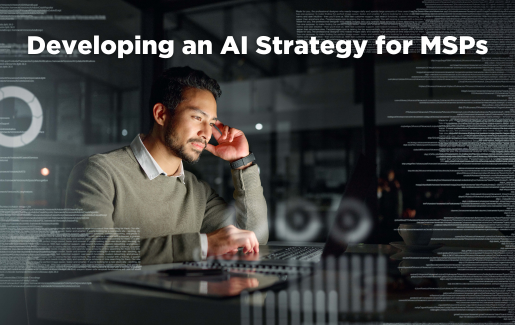
Artificial intelligence (AI) is transforming how we interact with technology and how organizations operate. Whether it’s streamlining complex processes, optimizing costs, improving productivity and responsiveness, enhancing customer experiences or facilitating decision-making, AI has proven to be an invaluable and versatile tool for organizations of all sizes.
Speakers from CompTIA ChannelCon 2023 explored key considerations when developing an AI strategy to drive business growth and efficiency.
Why Do You Need an AI Strategy?
AI is no longer a futuristic concept; there are now real-word AI applications helping organizations across various industries gain a competitive advantage. By developing an AI strategy, you can ensure that your business stays ahead of the competition and doesn't get left behind in the race for innovation.
Improve Efficiency and Productivity
AI can process and analyze data much faster and on a larger scale than a human brain can, identifying patterns, trends and predictions that are beyond human comprehension. This enables AI to automate repetitive tasks and streamline processes, freeing up time for employees to focus on more complex and creative tasks.
Jason Juliano, director of digital transformation at EisnerAmper, emphasized how MSPs can implement AI, from sales to service delivery, to create opportunities that drive more value and revenue not only for your business but for your clients as well. Juliano added that predictive and corrective maintenance are particularly important for MSPs to maintain healthy margins.
“Don’t look at AI as a way to replace people, look at it as a way to make your day to day easier,” said David Tan, CTO at Crushbank. When adopting AI, Tan mentioned that it’s important to focus on achieving small wins that increase profitability and overall performance. He also pointed out the untapped potential in sales and marketing and the wealth of data available for analysis, emphasizing the significance of data-driven insights.
Enhance Customer Experience
AI-powered chatbots, virtual assistants and personalized recommendations are just a few examples of how AI can enhance the customer experience. By leveraging AI, you can provide a more personalized and efficient experience for your customers, leading to increased satisfaction and loyalty.
Enhance Educational Experiences
Mechie Nkengla, CEO/chief data strategist at Data Products, LLC, added the importance of using AI to enhance educational processes, such as developing innovative educational tools and platforms.
“Everything is a model; the MSP industry, every MSP, every position, every employee and every process,” said Daniel Wang, CEO at MSPbots.
5 Common Mistakes When Deploying AI/Automation
While implementing AI and automation strategies, it's important to be aware of potential pitfalls that could derail your efforts.
Wang noted 5 common mistakes:
- Not having the right mindset and culture to do relentless automation
- Not having good manual processes
- Not having dedicated resources for automation
- Not engaging with the community
- Wrong expectations: It’s not just about setting it and forgetting it
Wang also stated that 90% of MSP problems relate to people and processes, including:
- Insufficient and outdated processes
- Challenges in finding quality employees
- Inability to manage massive amounts of data
- No content, system and resources to properly train people
- Difficulty finding qualified management team to enforce processes
Taking proactive steps to address these challenges can pave the way for seamless integration of AI technologies within MSP operations, fostering efficiency and innovation.
Best Practices for Developing AI Strategies
When discussing return on investment (ROI), Dr. Seth Dobrin, founder and CEO at Qantm AI, explained that negative ROI is the result of two main reasons:
- Not defining upfront what the expected ROI is
- Not prioritizing projects based on ROI or impact because they lack a strategy to begin with
Dobrin discussed the importance of building an AI strategy that aligns with business objectives to increase profits and enhance the lives of customers and employees.
Let’s take a look at some best practices and considerations when developing your AI strategy:
Identify Use Cases and Adopt a Client-Centric Approach
Understand your clients’ specific needs and goals to help you customize your AI solutions – ultimately enhancing your services. Consider the following questions:
- Where are the two or three spaces that you could add the most value to your customers?
- What differentiating capabilities can you build that only you can bring to your customers using AI?
- Who are you going to turn away from using AI?
- What do you hope to achieve by implementing AI? Are you looking to improve efficiency, reduce costs or enhance the customer experience?
But before determining your specific AI use cases, Nkengla advised MSPs to first be educated on AI and its underlying technologies, including process automation and analytics. Then, focus on identifying personalized use cases tailored to your unique business needs based on:
- How you operate
- Clients you serve
- Solutions you need
- Infrastructure and resources available
- Overarching business strategies
Then, prioritize use cases based on feasibility, ease of implementation, impact and alignment with your business goals. Start with small, manageable projects at the top of the priority list, launch them, gather feedback, iterate and repeat the process.
Assess Current Capabilities and Avoid Overcommitment
Tan advised not to oversell your expertise in AI and to be aware of your limitations as an MSP. MSPs should also seek partnerships with experts and guidance from the legal team, especially concerning legal aspects, contracts and acceptable use policies related to AI technologies.
Create a Technology Roadmap
Developing an AI strategy is not a one-time task; it requires a long-term plan for implementation and growth. A technology roadmap will help you outline the steps needed to achieve your AI goals and objectives. This could include acquiring new technology, hiring additional staff or investing in training and development. A roadmap will also help you prioritize your initiatives and ensure that they align with your overall business and innovation strategy.
Consider Legal and Ethical Implications
The prevalence of AI and ChatGPT have created legal and ethical implications that need to be carefully considered and addressed. Juliano and Tan emphasized the need for governance rules and security controls in place to maintain responsible AI usage, especially as more vendors embed AI technologies in their products.
Concerns around attackers using AI to enhance their tactics, like automating attacks, is growing. But Juliano pointed out that this not only highlights the ongoing need for defense solution providers but also the rapid evolution of cyber threats, increased responsibility to protect sensitive data and importance of creating multiple layers within the cybersecurity environment. Ensuring business longevity requires constant alignment with emerging technologies and strategies.
“The bad guys will continue getting smarter and leveraging these greater technology tools, and it's our job to make sure that we have enough layers within the security ecosystem to protect our clients,” Juliano said.
Invest in Training and Development
Juliano encouraged MSPs to invest in education and training for staff to stay informed about the evolving AI landscape. Having AI experts within the organization can help drive AI initiatives, educate clients about AI and set realistic expectations regarding capabilities and limitations. MSPs should also continuously assess the market to stay ahead of the curve and align strategies accordingly.
Define KPIs and Expected ROI
MSPs need to define expected ROI and KPIs upfront when implementing AI solutions, then adjust strategies based on the results.
Evaluate and Leverage Vendors
Small MSPs can benefit from leveraging large, foundational models that are being created by larger organizations. These models often have advanced capabilities that might not be feasible for a small MSP to build.
“Start with what is the use case that you're trying to solve and look for which vendors will address those use cases,” said Manoj Suvarna, managing director of AI and data alliances and ecosystems at Deloitte Consulting, LLP.
When dealing with vendors, MSPs should also thoroughly assess how the vendor handles data and ensure that they have comprehensive policies that protect company and client data.
Foster a Culture of Innovation
In order for your AI strategy to be successful, it is important to foster a culture of innovation within your organization. This means encouraging employees to think outside the box, take risks and embrace new technologies. By creating a culture of innovation, you can ensure that your business is always looking for ways to improve and stay ahead of the competition.
“It's not just about the technology. It's about skill set, it's about the people and it's about the intent strategy that you have on how you approach it,” said Suvarna.
Join the AI Conversation!
Ask questions, get answers in CompTIA’s AI Technology Interest Group.

 Add CompTIA to your favorite RSS reader
Add CompTIA to your favorite RSS reader

